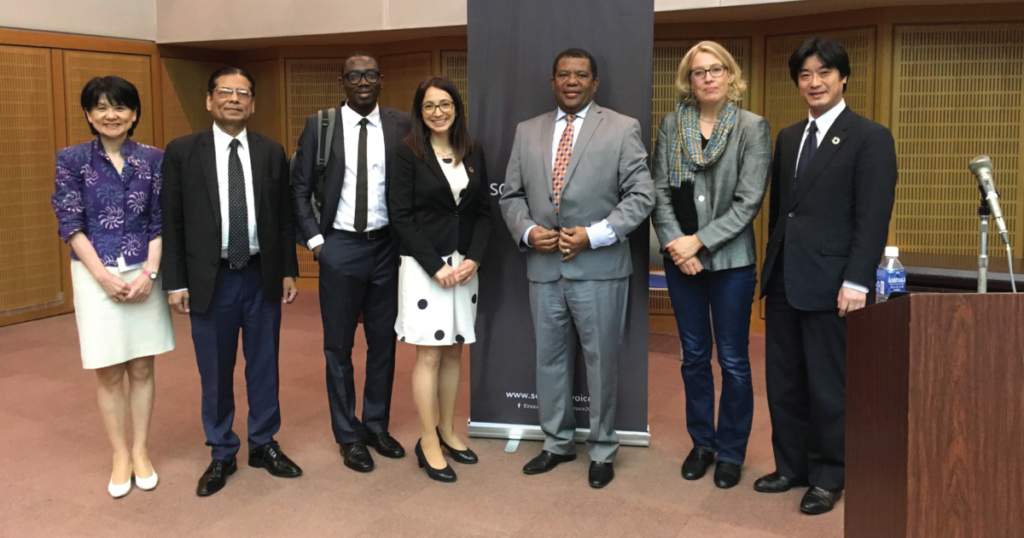
The 2030 Agenda is an ambitious and universal commitment. As such, its implementation poses numerous challenges due to the diversity of contexts across and within countries and regions adopting the Agenda. With that in mind, Southern Voice and JICA RI co-organized a panel discussion to analyse these challenges within the frame of the T20 Summit held in Tokyo on 26-27 May 2019. The panellists talked about the progress made on the 2030 Agenda in Africa, Asia and Latin America. Some of the findings presented on regional progress are research components of the upcoming Southern Voice “State of the Sustainable Development Goals” report, which will be launched in September 2019.
Countries around the globe are moving at a different pace in the achievement of the 2030 Agenda. There is a general awareness of the need to translate a global agenda to the regional, national and sub-national levels in a way that it matches local contexts. Belay Begashaw from the Sustainable Development Goals Center for Africa corroborated that “there is a need to ‘domesticate’ the Sustainable Development Goals or, in other words, there is the need to translate global targets into the local socio-economic context and concrete activities”.
Coherence in the Agenda’s adoption also involves developing policy alignment across sectors. This implies starting to consider that the fulfilment of a goal sometimes generates positive or negative outcomes in the achievement of other Sustainable Development Goals (SDGs). In an ideal scenario, countries should maximise these positive outcomes and minimise negative ones. However, this is easier said than done, especially at the national level. According to Rebecka Villanueva from Instituto Mora, Mexico shifted from previous development plans to respond to the challenges posed by the 2030 Agenda. Nonetheless, there is not enough inter-ministerial cooperation. In turn, lack of coordination across sectors slows down SDG implementation at the national level. This is the case not only in Latin America but also in other regions.
Still, coordination across sectors is possible explained Mr Katsuki, from the Ministry of Foreign Affairs of Japan. After adopting the 2030 Agenda, the Prime Minister established a cabinet for the promotion of SDGs. Japan prioritised eight key areas and assigned tasks and responsibilities to the respective ministry. The establishment of stable institutional structures and the existence of policy alignment placed Japan on the right path towards 2030.
In the case of Africa, Adedeji Adeniran from the Centre For The Study Of The Economies Of Africa (CSEA), reinforced the need for translating the Agenda from the global to the local level. For example, at the regional level, the Agenda 2063 fostered by the African Union, and the Agenda 2030 are consistent with one another. Although the coordination is promising at the regional level, translating the Agenda into national and subnational contexts is challenging due to how priorities have been set. In Nigeria, economic related goals are prioritised over social or environmental ones. Since the Agenda cannot be achieved in silos, its implementation requires that none of the economic, social and ecological aspects is overlooked.
In Asia, like in Africa and Latin America, implementation varies across countries. Mustafizur Rahman from the Centre for Policy Dialogue (CPD) acknowledged that at the national level, coordinated actions are in place. Asian countries have successfully prioritised targets and have adapted the Agenda accordingly to the national context. For example, Bangladesh established a steering committee for the implementation of the SDGs, while Laos, a country affected by landmines, developed a national goal. SDG 18, as it was named, focuses on creating awareness on the risks posed by landmines. Although the situation is promising at the national level, lack of coordination is still the challenge to overcome at the subnational level.
Three additional elements also play a key role in the achievement of the 2030 Agenda: resource mobilisation, the creation of partnerships and data availability. The panellists agreed that domestic resource mobilisation is a priority. The success of the SDGs requires that all available resources are mobilised to finance sustainable development. Currently, this remains a challenge for Africa, Asia and Latin America alike. Professor Rahman mentioned that yearly investments for the infrastructure required for the achievement of the SDGs in Asia alone reach approximately 3 trillion USD. Partnerships are essential to guarantee funding, and also to share technology, knowledge and expertise. Even though at the global and the regional level progress on partnerships has been attained, strengthening them is crucial for the advancement of the Agenda. Finally, to achieve the SDGs and so for countries to be able to report on progress, good and accessible data is vital. Robust reporting mechanisms are crucial to transparency and accountability.
Regions, whether they are on the right path or not towards the implementation of the 2030 Agenda, face numerous challenges. They range from eradicating inequality, guaranteeing constant innovation, adequate infrastructure and access to technology, to financing and mobilising resources. In spite of the progress made so far on implementation, the path to 2030 is still in the making.
Authors:
Estefania Charvet, Programme Officer, Southern Voice for the State of the Sustainable Development Goals (SDGs) initiative
Professor Mustafizur Rahman, Distinguished Fellow, CPD
Published by: Southern Voice
Reposted from Southern Voice Blog

